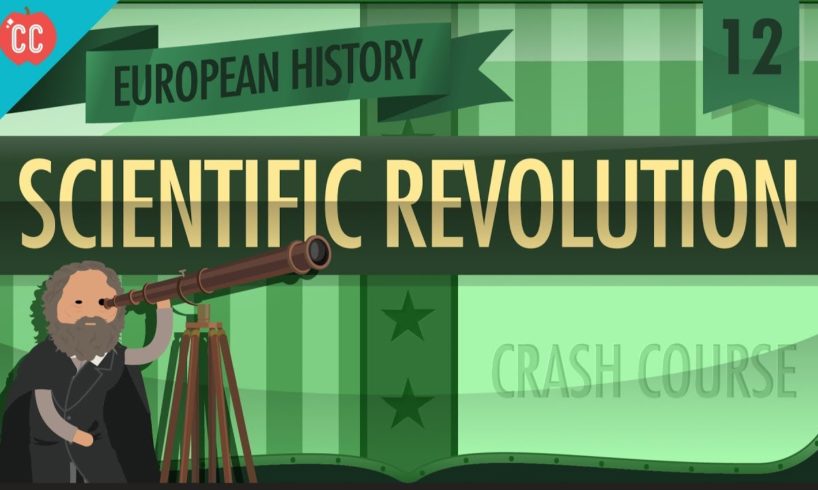
There was a lot of bad stuff going on in Europe in the 17th century. We’ve seen wars, plagues, and unrest of all types. But, there is some good news. Huge advances were underway in the scientific community in Europe at this time. In this video we’ll look at the progress of knowledge with Galileo, Copernicus, Kepler, Harvey, Newton, and more.
Sources
-Hunt, Lynn et al. The Making of the West: Peoples and Cultures, 6th ed. Boston: Bedford St. Martin’s, 2019.
-Porter, Roy and Mikulás Teich, eds. The Scientific Revolution in National Context. Cambridge: Cambridge University Press, 1992.
-Shapin, Steven. The Scientific Revolution. Chicago: University of Chicago Press, 1996.
Crash Course is on Patreon! You can support us directly by signing up at http://www.patreon.com/crashcourse
Thanks to the following patrons for their generous monthly contributions that help keep Crash Course free for everyone forever:
Eric Prestemon, Sam Buck, Mark Brouwer, Timothy J Kwist, Brian Thomas Gossett, HAIXIANG N/A LIU, Jonathan Zbikowski, Siobhan Sabino, Zach Van Stanley, Bob Doye, Jennifer Killen, Nathan Catchings, Brandon Westmoreland, dorsey, Indika Siriwardena, Kenneth F Penttinen, Trevin Beattie, Erika & Alexa Saur, Justin Zingsheim, Jessica Wode, Tom Trval, Jason Saslow, Nathan Taylor, Khaled El Shalakany, SR Foxley, Sam Ferguson, Yasenia Cruz, Eric Koslow, Caleb Weeks, DAVID NOE, Shawn Arnold, Malcolm Callis, William McGraw, Andrei Krishkevich, Rachel Bright, Jirat, Ian Dundore
—
Want to find Crash Course elsewhere on the internet?
Facebook – http://www.facebook.com/YouTubeCrashCourse
Twitter – http://www.twitter.com/TheCrashCourse
Tumblr – http://thecrashcourse.tumblr.com
Support Crash Course on Patreon: http://patreon.com/crashcourse
CC Kids: http://www.youtube.com/crashcoursekids
source







Anyone else here from the Yaqeen Curriculum
Not me watching this video cause it was assigned by my teacher.
Notes
Helliocentric – the sun, (rather than the earth) is at the center of the universe.
Scientific method – experimentation & Mathematical calculations used to confirm or refute hypotheses
Inductive reasoning – reaching the truth and drawing conclusions from specific reliable facts or evidence
Deductive reasoning – faith In the rational power of the mind to generate specific truths from its own theories or power of thinking (philosophy)
Real = follows the human powered scientific method of observation.
All knowledge of reality starts with experience and ends in it – Galileo (the father of Modern Physics)
For the record, if you have a particle accelerator and sone spare electrons to shoot, you can turn lead into gold. Just not at scale
Best youtube-channel ever.
I still think John Green has his humor it just subtle. It was funny the way he screamed and put down Yoric's skull. That was funny for me. John Green you're still funny to me. Keep up the wonderful work.
ok, why are there sausages in every slide of a scientist, someone explain
can someone tell me the name of the painting at 1:21
who else is watching this for a school assignment
What's the painting at 0:26? It's just beautiful how it portrays scientists as people who bringing light into the world, otherwise such a dark place.
The only thing I worship is the bad booty XD
It's actually NOT impossible to turn lead into gold and it has already been done in the modern age, HOWEVER it costs more money to do so than the price of gold, so it's futile.
"And Rene Descartes was a drunken fart, "I drink, therefore I am." "
~Monty Python
who came here to watch teh vid to do history assignment
Dickhead…. science was the religion of barbarians of alchemy… .while hygiene reforms were responsible for the eradication of disease .proven with fact and true empirical science.
The universe may not be an onion, but ogres still are.
HAHA!! You are taking quite a few shots in this vid!!!
Copernicus loved the catholic church and like wise
I was in college, taking a class on the Reformation and Counter Reformation (history buffs take odd classes, folks!) when the formal announcement came that Galileo had been wronged by the church was made. We sat in class, watching this on CNN (I think it was CNN) and giggled our buts off as the Vatican officials admitted not only that they'd been mistake to charge Galileo with heresy, but that they'd been teaching Galileo for centuries at their schools and universities despite never formally clearing him of heresy. It was one of the most amusing afternoons I spent that year, watching grown men in black dresses trying to double-speak in multiple languages at once to excuse something for which they should have apologized before George Washington was born
we just gonna ignore that fact that there was a UFO just flying around
Maybe it's the age but he looks sad now.
John sounds kinda sad
Idk what to call this but here: like the Reformation, The scientific revolution was another break with religious teachings,
Sciencing?
They were persecuting for SCIENCING?
Neuton in 9:50 looks like ninja lol
Fantastic visuals. Damn.
I miss “Me from the past”
"imagine a world where you have to choose between a set of facts and a set of 'alternate' facts…"
hmmm…
The scientific revolution is the mother of all revolutions. The revolution starts un the mind!
ap euro 2020 who else
Funny how nowadays the Catholic Church operates it's own observatories.
And yet ,all of them were men
I see some criticisms below about timing of scientific progress/revolution, probably right (I'm not a science student). BUT in overall context of a 'snapshot' of themes in European history, I agree that the main issue in 16-17th century was opposition to change by 'Rome' which was coming under attack at so many levels: Protestants, feisty 'absolute' monarchs and princes, even Islam in eastern Europe…..so the church dug its heels in. (Also agree that, with hindsight, we see that Newton, Galileo etc were 'right', but they were also of their time so continued to believe in alchemy, astrology etc and would probably have agreed with persecuting 'witches')
So the Catholic church viewed Galileo's heliocentric work as heretical until over 20 years AFTER the Apollo Moon landings? Wow!
For all the people studying for the AP Euro exam while in quarantine, we are in this together <3
johannes= Yo-hans
What is video for the 30 years war ?
"The solar system was a solar system, not an onion"